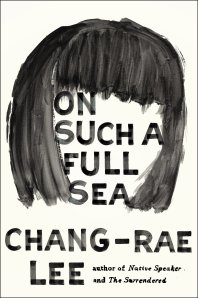I dislike reviews that begin, “I really wanted to like this book.” They sound so dismissive, and so definitive about it. “I tried my hardest, guys, but this book just sucks.” Did it, though? Did it really?
I know, I know: I shouldn’t be so sensitive. I’m only annoyed because I did like this book, and I want everyone else to like it with me. (Fortunately, most of the folks on GoodReads did.) I can see where the review-writer is coming from. After all, who hasn’t picked up a book they were sure they were going to like, only to be disappointed?
The fact remains, I did like this book. I want to convince others to read it so they’ll talk about it with me. I am only slightly nervous that they’ll react the way that one reviewer did.
On Such a Full Sea is about a civilization on the brink of decline. The book takes place in a far-future America where the ruins of the cities have been converted to labor colonies, inhabited by throngs of citizens brought over from the collapsed country of “New China”. The job of the Colonies is to provide food for the elite, who live in the former suburbs, in beautiful housing developments deemed Charters. The largely unseen “everyone else” lives in the boundless territories of the Open Counties: a land about which little is known, and much is feared.
The book begins with this quote from Julius Caesar by William Shakespeare:
We, at the height, are ready to decline.
There is a tide in the affairs of men,
Which, taken at the flood, leads on to fortune;
Omitted, all the voyage of their life
Is bound in shallows and in miseries.
On such a full sea are we now afloat,
And we must take the current when it serves
Or lose our ventures.
Young Fan is the first to take the current. An unlikely heroine, she is employed as a diver, cleaning the tanks of fish that B-mor (formerly Baltimore) produce for the Charters. She is content with her job, and happy with her boyfriend, Reg, a kindhearted but average fellow who works tending the trays of vegetables that grow above the fish tanks. When he disappears one day without a trace, no one can say why. Nor can they imagine why the devoted and gentle Fan would poison the tanks of beloved fish she cared for before setting out into the Open Counties to find him.
Is this, then, a simple love story of a girl set out to save the boy she loves? Lee makes it clear from the beginning it is not:
It couldn’t have been just Reg she had gone to search out. She had no real leads as to where he might be, or if he was even alive. So why would any sane person leave our cloister for such uncertainties? He was the impetus, yes, the veritable without which, but not the whole story. One person or thing can never comprise that, no matter how much one is cherished, no matter how much one is loved. A tale, like the universe, they tell us, expands ceaselessly each time you examine it, until there’s finally no telling exactly where it begins, or ends, or where it places you now.
As much as this is a story about Fan, it is a story of how her story will impact upon the world she left behind. The narrative is told in first person plural, describing how “we” the citizens of B-mor might view the strange, inspiring story of the unlikely Fan, and where it might lead us as a society.
All right, so the POV is difficult to get into at first. Very few stories are written in first person plural, and in the beginning, I found it jarring. I got used to it fairly quickly, though, and in the end, the author’s choice of perspective serves a purpose, and serves it well.
I was most frustrated by the breaks in the action. A new development would occur, or Fan would find herself in peril, and the next chapter would shift focus, describing what is happening back at B-mor, or some other background detail to the story. I often found myself tempted to skim or skip through these parts, and being a pleasure reader less concerned with discipline and completeness, and more interested in my own enjoyment of a book, I occasionally did.
In the end, though, I’m glad I was a little more strict with myself than I usually am. After all, this is a tale much rounder than the shape of Fan and her adventures; a fact I only began to appreciate fully as her story drew to an end.









